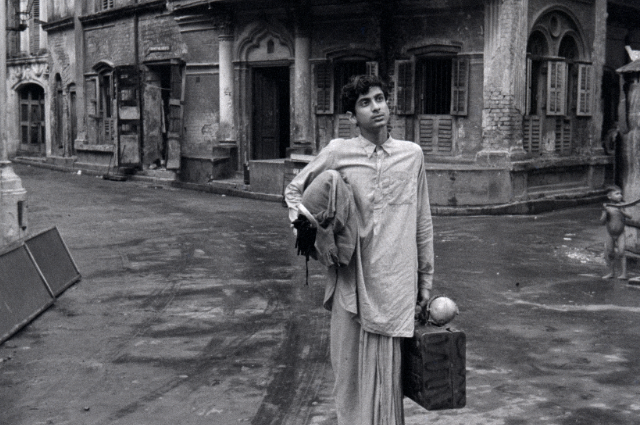Walking down the memory lane through the mist of time, many years ago, one sultry Summer evening the blue screen of our black and white television set came alive with the eternal sequential of Satyajit Ray's “Aparajito” (The Unvanquished).
Amid my staid mesmerism through half way of the film appeared the lean and lanky frame of an adolescent with two eternally romantic eyes and a voice so infused with a blissful softness that infiltrated my inner self unknowingly. It was my father's instant utterance that pronounced two words Smaran Ghosal. And for the remaining part of the movie that impeccably natural cinematic performance of that adolescent actor took my youthful soul from marvel to marvel at discovering and realising the myriad revelations of life in all its true colours for the first time, leaving undying scars on my mind. Today after all these years those scars are as fresh as that of yesterday. Such was the legacy of that adolescent actor.
In every single sequence of this second installment of Ray’s Apu Trilogy the naturally gifted impersonator Smaran Ghosal got immersed in giving life to the entity or Apu, the protagonist of the film, in an execution of such a master craftsmanship that to the eye of an ordinary beholder like me he became Apu. Through each and every frame he delivered the humanely Apu in all his panoramic juxtapositions with such an aplomb that even in the two-dimensional celluloid presence Apu breathed the air in all his flesh and blood in the unwilling suspension of my disbelief.
In the very first appearance at the head master's office door entering the room with a pristine smile on his face we are introduced to this one-in-a-million soul called Apu. Then from imparting the news of his wining scholarship in matriculation to his mother while radiating with the joy of a blithe spirit to an immediate shift to the pensive mood suppressed by anger while bickering with her over fulfilling his ambition of relocating to Kolkata for advanced studies, the natural talent of Smaran Ghosal breathed life to the tactility of Apu. The brilliantly natural actress Karuna Banerjee as Sarbajaya Apu's mother was sharply precise as the village mother hiding under the veil of motherly anger her anxiety about all the possible dangers her innocent son might find himself into.
Afterwards the gradual immersion of Apu amidst the newly discovered galore of a buzzing metropolis resulting into the slow distancing from his mother and the subsequent return to the neo-natal bonding with her on his arrival to their village house from Kolkata left an everlasting impression on me. The subsequent scenes capturing the mother - son interactions with the focus on the mother's curiosity about her son's wellbeing in a new place and the city were sharply piquant. Albeit a little distracted on account of his parallel city life Apu could not bypass the umbilical gravitational pull while waiting for the train to Kolkata at the village railway station reminiscing the face of her ailing mother bidding farewell to the apple of her eyes with the fading smile on her face in a desperate attempt to hide her rapidly deteriorating health and the resultant mental agony. That desist Apu from boarding the train and return to his mother for one more day. Who could forget the very scene of Sarbajaya's enlightened face at the vision of Apu returning home in a languid stroll on the village road? Then after the back-to-back close ups of Sarbajaya's gloomy face with dark circled eyes beholding the premonitions of her on - rushing death and brooding over her distant son stayed on my mind with the lasting scars.
In the end those immortal shots captured the subdued tensions of a helpless adolescent returning home at the news of his seriously ill mother and finally the mad pursuit of a son in all his fragilities searching for his departed mother at every corner of the house. The close ups capturing the strange fusion of sorrow and the fear of losing the pre - natal tie and the subsequent breaking down at the realisation of his mother's demise tore me apart temporarily emasculating my zest for life. And then Apu's final departure from the village with the firmness of a warrior approaching the distant horizon signifying the world itself left me speechless for many hours after the film ended.
The way this teenage actor had related and improvised all those difficult scenes with the reflection of a silent strength that set Apu and the actor himself at a height insurmountable for eternity. I wondered how an adolescent facing the camera for the first time could depict the severe inner turmoils and the pains of life with such an effortless felicity had it not been by his unfathomable abilities of introspection and self realisations. And it was these gifts of an adolescent named Smaran Ghosal that had left indelible marks on my mind. By the time Satyajit Ray had cast him Ghosal was all of twelve or thirteen at the most. It might be that Ray himself could not have imagined that this young soul was about to deliver the most memorable performance by an adolescent ever catapulting Aparajito into the greatest feature film ever made in the history of world cinema. Ghosal had instilled his unvanquished spirit into breathing life to Apu who had vanquished the inner spirit of the writer of this article.
From the unaffected tenement of pristine metropolis of the early twentieth century Kolkata Apu had entered into my soul. He would remain there till the last day of my life. And so would that adolescent actor Sri Smaran Kumar Ghosal.

